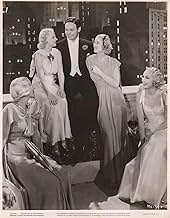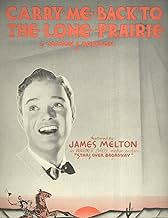Al is a down-on-his-luck promoter who is thinking of taking the final bow when he meets singing porter Jan. He sees something in Jan so he signs him to a contract. Al works odd jobs to pay f... Read allAl is a down-on-his-luck promoter who is thinking of taking the final bow when he meets singing porter Jan. He sees something in Jan so he signs him to a contract. Al works odd jobs to pay for Jan's singing lessons and drops the idea of Opera when he learns that it will take year... Read allAl is a down-on-his-luck promoter who is thinking of taking the final bow when he meets singing porter Jan. He sees something in Jan so he signs him to a contract. Al works odd jobs to pay for Jan's singing lessons and drops the idea of Opera when he learns that it will take years. He has him sing in a nightclub and from there it is up. But Jan soon starts missing les... Read all
- Mustached Man at Champ's Table
- (uncredited)
- Man Wanting Testimonial
- (uncredited)
- Jim Flugel
- (uncredited)
- Man in Church
- (uncredited)
- Charlie
- (uncredited)
- Listener in Italy Montage
- (uncredited)
- Man
- (uncredited)
Featured reviews
This is not my kind of music. I don't want that to influence my review, but it does not help. I can do without this Pat O'Brien character and I don't find Melton that good as an actor. He's obviously a better singer. I actually like the comedic side characters. They save little moments within a rather bland movie.
Columbia made a successful opera star film, now everybody got into the act. Twentieth Century Fox signed Lily Pons, Paramount inked Gladys Swarthout, MGM had Lawrence Tibbett for awhile. Nelson Eddy made the only real transition from grand opera to Hollywood.
Anyway Warner Brothers signed Metropolitan Opera tenor James Melton and I have to say he had a very pleasant voice and a personality that was easy to take. He's a bellhop who's voice comes over into Pat O'Brien's room as down on his luck theatrical agent O'Brien is contemplating suicide. Not an uncommon thing in the Depression as people became paupers overnight at times.
The rest of the film is the trials and tribulations Melton and O'Brien go through. The song Melton sang, Carry Me Back to the Lone Prarie, a cowboy ballad became a staple item during his concerts.
Another interesting piece of trivia is that the song September in the Rain was cut from the finished film. You can hear it played in the background. It was sung in another film by James Melton called Melody for Two and became a popular hit for him.
Jane Froman is also in the film and it's interesting why she never became a film star, except really in her own autobiographical film, With a Song In My Heart where she sings with Susan Hayward lipsynching. She had the looks and the voice. Who can tell about these things.
I recommend this film highly so people can get to hear what a couple of real good singers are like from the thirties. Especially Melton. I happen to have a few recordings of him and he has an infectious lilt in his voice. The only film that's really available for people to see him in is The Ziegfeld Follies where he and Marion Bell sing an aria from La Traviata. It was a good number, but Melton did so much more than that.
O'Brien wants quick results, though, and betrays him, making him a more popular-style singer who can rake in the bucks. He does and stardom goes to his head but he takes to the sauce, betraying O'Brien in return.
This is not the first time I've seen O'Brien in a role that suggests gay or closeted gay feelings. The reconciliation between these two is strange indeed for a scene between two men in a mid-thirties movie.
O'Brien wants to make a star of Jean Muir, too, but Menotti hears her "Ave Marie" sung in church and doesn't think she has the goods. She and O'Brien end up together but the movie is really about his and Melton's characters.
It is dark and quite elegant, a touching movie whose title has little to do with it and is misleading. Perhaps O'Brien smiles once but if so, it is the exception rather than the rule. His performance is subdued and he seems beaten down.
Froman was an attractive singer with a distinct, wonderful voice who entertained on stage, radio and the nightclub circuit in the 1930s through 1950s. She sang in the Ziegfeld Follies and had her own TV show on CBS. She was one of the earliest entertainers to sign on for the USO program to entertain GIs during WW II. But on her February 1943 plane flight to Europe, she was seriously injured when the plane crashed in the river bay before landing in Lisbon. Froman spent a long time in recovery, and had many operations during her lifetime for injuries to both legs and one arm.
After recovering in a Spanish hospital, she returned to the States for many more months of recovery. She was able to sing again, but had to sit in a wheelchair or be supported standing. She then flew back to Europe to entertain the troops during the last year of the war. After that she sang a few more years in the States and then settled down in her hometown of Columbia, Missouri. She has three stars on the Hollywood Walk of Fame for radio, recording and television.
It's too bad Froman didn't appear in any of the many musicals that were being made in the late 1940s and early 1950s. Her voice was distinctly remarkable and she had a very good stage persona. Those who enjoy her singing and would like to hear more might watch the biopic musical that was made about her life. It's an interesting and entertaining film, and Froman sings all the numbers that are then dubbed for Susan Hayward who plays her part. The film is "With a Song in My Heart" of 1952, by 20th Century Fox.
Fortunately the film has Pat O'Brien, Frank McHugh and Marie Wilson to inject some life into the proceedings but even with them it's an average affair.
The real reason to catch this is the presence of Jane Froman in the cast. The singer famed for her war work and catastrophic accident immortalized in With a Song in My Heart didn't make many films and while this one isn't much she sings beautifully.
Did you know
- TriviaMarie Wilson's first credited screen role.
- SoundtracksAt Your Service, Madame
(1935) (uncredited)
Music by Harry Warren
Lyrics by Al Dubin
Played during the opening credits
Also played when Freddy is introduced to Al and Jan at Witmark's
Performed by James Melton, Jane Froman and chorus
Details
- Release date
- Country of origin
- Languages
- Also known as
- To paidi tou dromou
- Filming locations
- Production company
- See more company credits at IMDbPro
- Runtime
- 1h 29m(89 min)
- Color
- Sound mix
- Aspect ratio
- 1.37 : 1








































